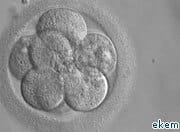Scientists have developed a revolutionary adult stem cell treatment which could lead to a cure for mitochondrial diseases without resorting to controversial GM baby techniques.
A study by Oregon Health & Science University (OHSU) suggests that people suffering from rare mitochondrial diseases could be helped by a technique which uses their own skin cells.
In February, MPs voted in favour of allowing Maternal Spindle Transfer (MST) and Pro-Nuclear Transfer (PNT).
Controversial
These controversial techniques would not help those who currently have mitochondrial diseases. MST and PNT would produce genetically modified children supposedly free from the diseases, but who would have three or four parents.
Dr Shoukhrat Mitalipov, from the Center for Embryonic Cell and Gene Therapy at OHSU, said: “Over the past several years, we have been working to generate stem cells for use in combating disease.”
He added, “combined gene and cell therapy will allow us to create the patients’ own healthy tissue that will not be rejected by their bodies”.
A study on the technique, which has not yet been trialled on humans, demonstrated that some skin cells from people with mitochondrial disease become free from mutations when they are converted back to stem cells in a lab. It is thought that the corrected stem cells could be multiplied and transplanted back into a patient’s body to repair damaged tissue.
Elegant system
Commenting on the development, Professor Darren Griffin, Director of the Centre for Interdisciplinary Studies of Reproduction at the University of Kent, said: “The authors have devised a very elegant system to correct the genetic defect in question.
“It will however be some time before it can be applied clinically given the need for clinical trials etc.”
MPs received a barrage of criticism from many in the scientific establishment after voting to legalise MST and PNT, also known as mitochondrial replacement, earlier this year.
Criticism
Christopher Exley, a professor of bioinorganic chemistry, warned that mitochondrial replacement “is a genetic experiment which could have disastrous consequences for generations”.
And Dr Trevor Stammers, Programme Director in Bioethics and Medical Law at St Mary’s University in London, said that MST and PNT are “nothing more than an uncertain experiment”.

